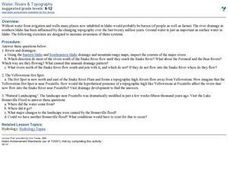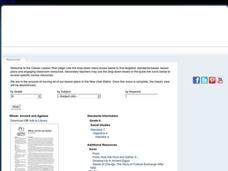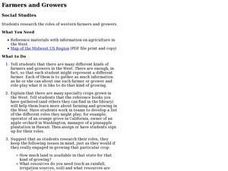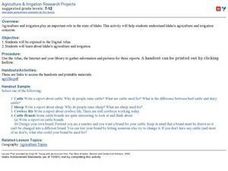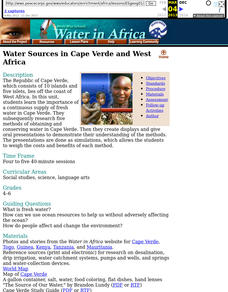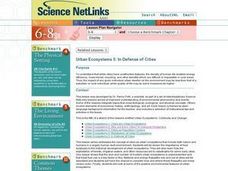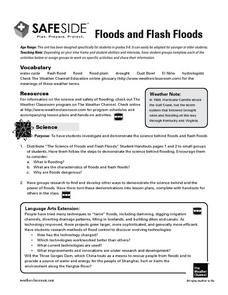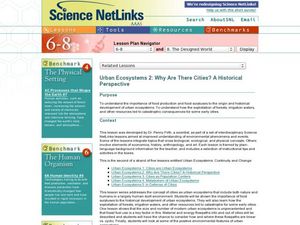Curated OER
Environment: Just Around the Bend
Students decipher landforms on a map and corresponding satellite imagery. They consider the impact of pollution on agriculture and water. They draw diagrams demonstrating how pollution works its way into the food source.
Curated OER
Water, Rivers & Topography
Students explore the topography of Idaho and the importance of surface water and drainage. using digital maps, they inspect the courses of major rivers, Yellowstone Hot Spots, and the natural landscaping of Pocatello. Students explore...
Curated OER
Water Exploration Station
Students explore the characteristics of water. In this water exploration lesson, students participate in various learning centers to inquire how water drains and how to increase the flow of water. Students use estimation and measurement...
Curated OER
Utah's Own
Fourth graders examine the effects of humans on the environment. In this Social Studies instructional activity, 4th graders analyze human changes to the environment. Students explore the actions and effects at a community level.
Curated OER
Wheat: Ancient and Ageless
Sixth graders investigate the role of wheat in society. In this Social Studies lesson, 6th graders explore wheat production from ancient civilizations to modern times. Students describe wheat's importance in shaping culture.
Curated OER
Water/Agua
Third graders complete water activities including vocabulary, visualization and performing activities. They study water vocabulary words in both English and Spanish. They listen to a read aloud of Jane Yolen's, Letting Swift River Go,...
Curated OER
Water Cycle
In this water cycle worksheet, students answer questions about the water cycle using a word bank. Students label a diagram of the water cycle.
Curated OER
Upstream And Downstream
Students gain an understanding of how elevation affects the flow of water. They discuss issues that can arise when residents and industries upstream pollute or irrigate a river, in opposition to those downstream. They role play opposing...
College Board
2002 AP® Environmental Science Free-Response Questions
Are electric motors all they're cracked up to be? Scholars take a stance and use their knowledge to discuss the benefits and disadvantages of the motor as the first question in a series of four. The questions that follow ask about other...
Curated OER
Farmers and Growers
Students explore the lives and work of the farmers and growers of specialty crops of the West. The amount of land and natural resources needed, the fertilizers utilized, and the market available for the crops are investigated in this...
Curated OER
Agriculture & Irrigation Research Projects
Young scholars one of the following topics to research regarding Idaho's agriculture. They may write a report about cattle or sheep as to why people raise them and what they are used for. They may also research cowboy life or cattle brands.
Curated OER
Cultural Lit. 26: Anasazi Pueblo: 1050 to 1300 A.D.
Sixth graders study Anasazi Culture through direct instruction and cooperative groups.
Curated OER
Four Ancient River Civilizations
Students explore how the environment shapes man, how man transformed his world, nd how art became part of the human process. The group is divided into clans and their migratory routes developed in the eight lessons of this unit.
Curated OER
Florida's Springs
Students calculate the water usage for irrigation of school grounds. They use maps in determining which areas are irrigated.
Curated OER
Water - Planning for the Future
Students explore and examine the increases and/or decreases for water user groups: irrigation, municipal, manufacturing, steam electric power generation cooling, livestock, and mining. They utilize percentage changes during their...
San Francisco Public Utilities Commission
Recycled Water: A Smart Way to Reuse Water
Learn about wastewater and recycled water with a science reading activity. After learners finish a two-page passage about conserving the water supply, they answer six comprehension questions about what they have read.
Curated OER
The First Farmers
Learners investigate how constant irrigation, with repeated evaporation of water eventually ruined farm land in southern Mesopotamia. They discuss the development of irrigation.
Curated OER
Is Your Water Clean?
Students conduct tests of water samples from different sources, such as a local river, tap water, and an irrigation ditch. After determining which pollutants are present in each sample, students hypothesize the possible sources of the...
Curated OER
Water Sources in Cape Verde and West Africa
Young explorers study the scarcity and importance of a continuous supply of fresh water in Cape Verde. They research the five main ways that fresh water is obtained in these countries. Each research group prepares a presentation, and...
Curated OER
Urban Ecosystems 5: In Defense Of Cities
Students explain that while cities have unattractive features, the density of human life enables energy efficiency, mass transit, recycling, and other benefits which are difficult or impossible in rural areas. This is the fifth in an...
Curated OER
Floods and Flash Floods
Junior geologists, hydrologists, or meteorologists simulate what happens during the flooding of a river and demonstrate factors that contribute to flash flooding. This outstanding resource provides a vocabulary list, online resources,...
Curated OER
Water Works
Students create a "water web" to illustrate the interdependence among water users and producers. They distinguish between direct and indirect uses of water; illustrate the interconnectedness of water users in a community; and demonstrate...
Curated OER
Urban Ecosystems 2: Why Are There Cities? A Historical Perspective
Students investigate the importance of food surpluses to the historical development of urban ecosystems.
Curated OER
Urban Ecosystems 4: Metabolism of Urban Ecosystems
Students discover that material and energy uses by a city come from outside the city boundaries. They realize that the pathway of these material is linear instead of cyclical as they are in natural ecosystems.
Other popular searches
- Irrigation Mesopotamia
- Ancient Egyptian Irrigation
- Irrigation Sumer
- Basin Irrigation
- Early Irrigation
- Irrigation Systems
- Irrigation and Fertilizer
- Irrigation in Egypt
- Ancient Irrigation
- Drip Irrigation
- Irrigation Egypt
- Egypt and Irrigation



